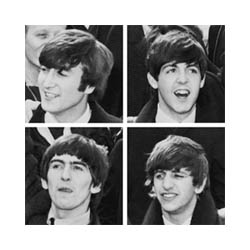
Question posed by chessparov
How have the Fab Four recordings helped you to make better recordings? Are there any specific techniques you picked up?
Reply by phat
Well, I have yet to get a chance (or have the guts) to mix a record the way I really want to. I realize the sound of those early stereo recordings of theirs was not supposed to be that way. “Revolver” is still my touchstone, after “Loveless” by My Bloody Valentine and just about anything from The Jesus and Mary Chain.
Reply by leeflier
I couldn’t tell you specifically what I’ve picked up. The Beatles’ whole vibe (and the Stones’ too) is so ingrained in every fiber of my being, that I think every recording I make has a lot of their influence without my even thinking about it. I think that’s true of a lot of people whether they know it or not – certainly their use of multitracks, tape loops, effects etc. have influenced pretty much everyone who came after.
I’ve certainly mic’d more than one drum kit with a mic in the “Ringo” position halfway down his chest over the snare. I think a lot of the ways that I like to use compression were lifted from Beatles records (and yeah, “Revolver” is my fave too overall, but some of the drum sounds on the White Album were incredible). And a cool three-part harmony, double tracked and drenched in plate reverb, never fails to give me the chills.
If I could ever make a recording that has a vibe like Rain I think I could die happy.
Reply by chessparov
One thing to respect IHMO about The Beatles is their recording metamorphosis from being “performance” orientation in their earlier albums to a tendency for meticulously crafted productions.
Like going from the 10 or 11 hours it took to make their first record to “Revolver”, et al. The turning point seems to be Beatles 1965, partly due to Dylan’s lyrical influence. Reading about the recording sessions, it’s simply astonishing how many classic songs were cut in the “early days” within five takes. The vocals for both “Rock ‘n’ Roll Music” and “Kansas City” were done in one take!
Reply by dwarf
“I’ve certainly miked more than one drum kit with a mic in the “Ringo” position halfway down his chest over the snare.”
Huh? I’m having trouble picturing this. Wouldn’t the mic get in the way? Can you give a description of this one?
Reply by themixfix
I use ‘The Beatles’ records to help me make MUSICAL recordings!!
I did live sound for a Beatlemania tour of Canada one summer, and (although I KNOW a LOT of Beatle fans DIDN’T like the whole idea of the show), I had the BEST time, and KNEW all the material SO WELL, that the cues came totally naturally to me,
PLUS, the guys were REALLY GOOD, and it was like getting to play Geoff Emerick/George Martin every night, but LIVE, in front of 10,000 Canadians, who LOVED the show! An excellent experience I’ll NEVER forget!!
Reply by mynewlife
The most important thing is they’ve made it very easy for me to never be tempted to have more than four mics on our drums…. mainly cause our set isn’t much bigger than Ringo’s in the first place.
Second, it just shows me that you can’t blame lack of tracks for deficiency… I just keep telling myself “Sgt. Pepper on a 4-track…. Abbey Road on an 8-track…..” and it makes me feel all invigorated.
Reply by ortrejos
Despite my love for the band, I´ve never read anything about the technical part of their recordings. What books/materials do you consider to be the best and most informative for the engineer/producer?
Reply by rivers
There are several good books…. check out Mark Lewisohn book which documents all the Beatles sessions at Abbey Road, also George Martin’s book “All You Need Are Ears” is straight from the horse’s mouth. Man I wish Geoff Emerick would write a detailed book about his time with the Beatles and others.
Reply by chessparov
“All You Need IS Ears” by George Martin! The creative grammar usage for the book’s title was intentional BTW.
